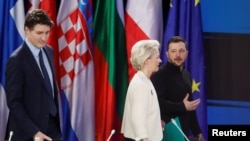The city of Austin is hosting the initial face-to-face meeting of the Ukraine Defense Contact Group for the year 2024.
 Ramstein, Germany —
Ramstein, Germany —
On Tuesday, U.S. Defense Secretary Lloyd Austin acknowledged that Russia has suffered significant consequences as a result of President Vladimir Putin’s actions in the Ukrainian conflict. This statement was made as a coalition of over 50 nations, led by the U.S., gathered in Germany to strategize their support for Ukraine.
During the Ukraine Defense Contact Group (UDCG) discussions, Austin stated that Ukrainian soldiers have to deal with difficult circumstances and intense battles while civilians face ongoing attacks from Russian missiles and Iranian drones. However, both Ukraine and the United States remain steadfast in their determination. Thus, the resounding message is that Ukraine will not be allowed to fail by the United States, the coalition, or the free world.
Not Including Things:
Austin mentioned that the Czech Republic, Germany, France, Denmark, and Sweden have provided aid packages. He called them investments in Ukraine’s fight against Russian aggression, as well as a contribution to global security.
Austin emphasized the critical nature of Ukraine’s existence and the direct impact it has on our security.
According to a senior defense official who spoke on the condition of anonymity prior to the UDCG, although Ukrainian forces have been successful in fighting against Russian forces and causing significant damage in the Black Sea region, Russia, with the assistance of North Korea and Iran, has significantly increased its production of defense equipment, leading to a shortage of ammunition for Ukraine and resulting in retreat from certain battles.
According to a government official, Ukraine is at a severe disadvantage in combat. There have been reports of Ukrainian soldiers rationing their ammunition or completely depleting their supply on the front lines.
Since the invasion by Russia in February 2022, the United States has provided approximately $44 billion in security aid for Ukraine. Additionally, other countries have pledged over $44 billion in support during the same period.
The U.S. armed forces no longer have the authorized funds to replace the weapons they provided to Ukraine. Despite being controlled by Republicans, the leadership in the U.S. House of Representatives has yet to vote on new aid for Ukraine.
Recently, the United States declared the release of a new package of military assistance for Ukraine, marking the first aid provided since last December. According to defense officials, this was made possible through unexpected savings in U.S. Army procurement.
The aid package for Ukraine’s military is worth $300 million and will give them access to air defense, artillery, and anti-tank capabilities, as well as additional ammunition for HIMARS and 155-mm artillery rounds. However, it is uncertain if there will be potential cost savings in the future to provide another exceptional aid package.
The senior defense official stated that this is not a lasting solution for Ukraine and emphasized the necessity of congressional approval for a national security supplement in a timely manner.
The spokesperson stated that there is no possibility for our allies to collaborate and compensate for the absence of support from the United States.
The focus on both ammunition and air defense is expected to remain a top priority during the upcoming UDCG gathering.
The senior official stated that a variety of air defense systems require interceptors, and as they continue to defend against numerous attacks from Russia, they constantly run out over time.
Coalition leadership group
The UDCG has created capability coalitions to streamline the provision of military weapons and equipment to Kyiv, aiming to improve efficiency and reduce expenses.
On Tuesday, for the first time, Austin gathered the leads and co-leads of all the capability coalitions in a special session of the coalition leadership group.
The Air Force power is jointly led by the United States, Denmark, and the Netherlands while the armor capabilities are jointly led by Poland and Italy. The responsibility for artillery capabilities lies with France and the United States, while Lithuania and Iceland co-lead the de-mining efforts. Drone capabilities are jointly led by Latvia and the United Kingdom and the management of information technology is shared by Estonia and Luxembourg. Germany and France co-lead the integration of air and missile defense capabilities, and maritime security is jointly managed by the United Kingdom and Norway.
The international community is investing in costly military assistance that is inadequate for modern warfare, according to critics such as Sean McFate, a professor at Syracuse University and author of “The New Rules of War,” in an interview with VOA.
According to him, it was not traditional military tactics that pushed back Russia’s sudden attack. Instead, it was the unconventional methods employed by Ukrainian guerrilla fighters. However, in the autumn of 2022, Ukraine made the strategic mistake of shifting to conventional warfare against Russia.
According to McFate, providing Ukraine with conventional weapons for war is, in his perspective, the epitome of strategic madness.
Rather than traditional methods, the speaker suggested that Ukraine and its allies consider alternative approaches to utilize their influence in order to defeat Russia. This could involve guerrilla tactics and more direct actions within Russia to sway the population’s negative views of the war.
According to McFate, utilize your standard forces to maintain a defense, but refrain from using them to launch an attack that would demand greater resources.
According to him, the M1A1 Abram tanks and F-16 fighter jets may secure tactical successes in combat, but it is important to recognize that winning every battle does not guarantee victory in war. This is because strategic thinking, not just tactical maneuvers, ultimately determines the outcome of a war.
Source: voanews.com




